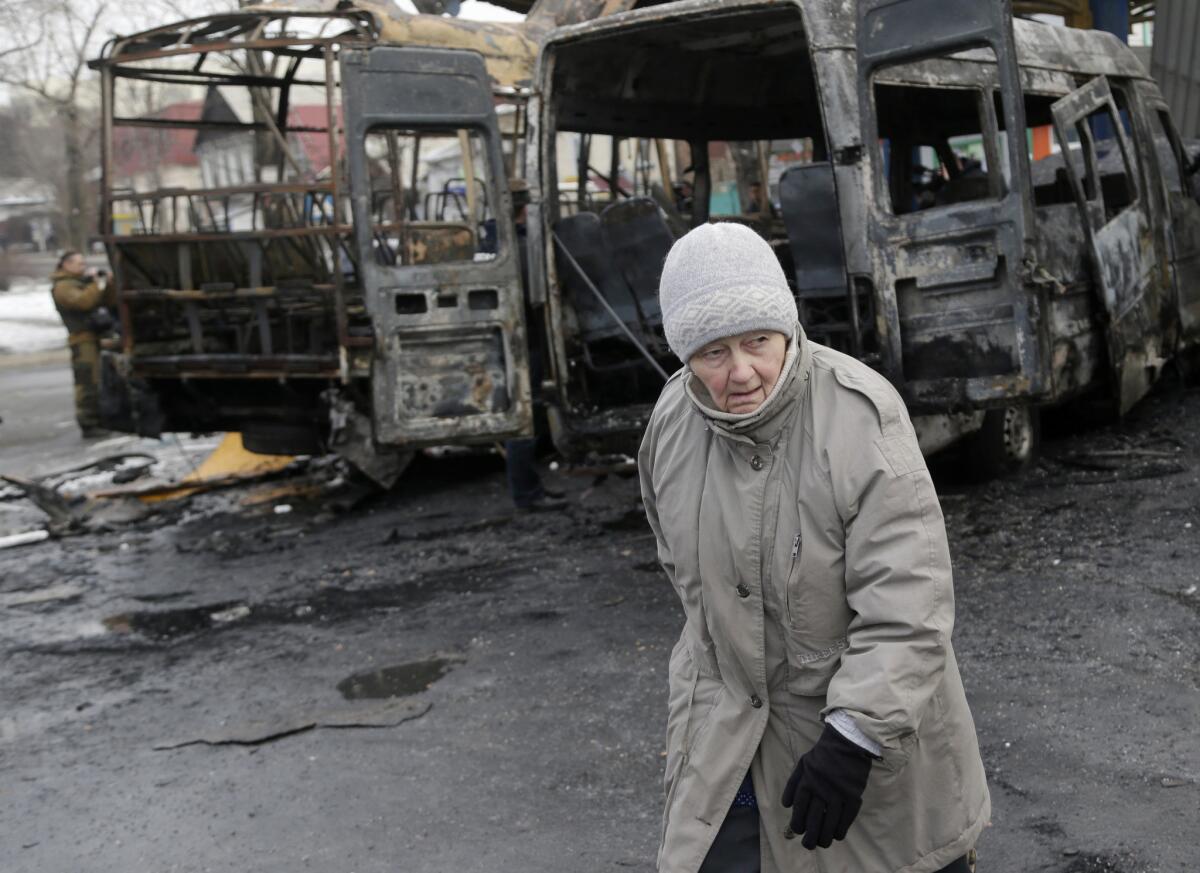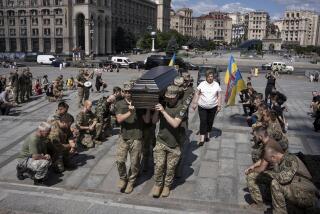Ukraine peace talks continue; no sign an agreement is near

Reporting from Moscow â The leaders of Germany and France closeted themselves with the Russian and Ukrainian presidents into early Thursday in a so-far unsuccessful attempt to negotiate an end to the nearly year-old conflict in eastern Ukraine.
German Chancellor Angela Merkel and French President Francois Hollande have been galvanized by a sharp rise in fighting and casualties in recent days, as well as by mounting calls among U.S. officials for Washington to send weapons to the Ukrainian government to level the battlefield. The fighting between Ukrainian government forces and Russia-backed separatists has killed more than 5,300 people in eastern Ukraine since April.
Merkel, Hollande, Russian President Vladimir Putin and Ukrainian President Petro Poroshenko met for more than six hours Wednesday and Thursday in Belarusâ capital, Minsk, in what was cast as a last stab at bringing peace to Ukraine.
The talks aim to elicit Putinâs and Poroshenkoâs commitment to a cease-fire, fixing of the boundaries of the territory each side controls, withdrawal of heavy weaponry and negotiations on more autonomy for the separatist-occupied regions within a more loosely structured Ukrainian federation.
Expectations of a breakthrough at the Minsk negotiations were low, not least because a European-brokered cease-fire agreement reached Sept. 5 never took hold. Merkel and Hollande organized the Minsk summit after visiting Kiev and Moscow last week as support seemed to be strengthening in Washington for delivering antitank weapons, radar systems and other arms and equipment to the Ukrainian government.
Even proponents of balancing the fight with the Kremlinâs separatist proxies worry that more weapons will mean more and deadlier fighting, not an end to it. Putin advisors have warned that such U.S. involvement in Ukraineâs affairs would destroy an already troubled relationship between the United States and Russia.
The separatists want to gain de facto international recognition of their authority in the territory they occupy, while the Kiev government is demanding that any cease-fire agreement restore its control of the Ukraine-Russia border that is now in rebel hands and open to unfettered infusions of troops and military hardware from Russia.
Before leaving for Minsk, Poroshenko threatened to impose martial law in the country if the talks fail to produce a peaceful solution.
Russian Foreign Minister Sergei Lavrov told reporters during a break in the talks early Thursday that they were proceeding âbetter than super.â But there were no indications from the participants that an agreement was near.
As the talks dragged into early Thursday, Russiaâs ambassador to the European Union said in an interview with Russia-24 television that there was broad agreement in Ukraine about the need to decentralize power in a country deeply split by language, culture and ideology. The Russian-speaking eastern regions held by the separatists are closely integrated with the economy of Russia and support staying entwined with their Eastern Orthodox brethren. In western Ukraine, where the dominant language is Ukrainian and most people of faith are Catholics, business and culture remain heavily influenced by Central and Western European neighbors.
Russiaâs EU envoy, Vladimir Chizhov, said in the state television interview that most Ukrainians, including the Kiev leadership, understand the need for regional autonomy to pursue the different interests of the population.
âI very much hope and believe in that,â he said when asked whether he expected the Minsk summit to be successful.
Chizhov also echoed other Kremlin officials in warning that any decision by the U.S. or Ukraineâs European allies to send weapons to the Kiev government would âadd oil to the flame of the conflictâ and raise the ârisk of direct-response involvement of Russia.â
In spite of satellite imagery showing Russian armored columns entering eastern Ukraine and captured Russian soldiers confessing they had been deployed to aid the separatists, Putin has denied that troops or weapons are involved in the conflict, which he terms a civil war.
Separatist representatives at the Minsk talks told journalists that a settlement of the conflict would be possible only if Ukraine pledged to retain its nonaligned status, which the Ukrainian parliament voted in December to renounce in the hope of eventually joining the North Atlantic Treaty Organization. A Tass news agency report from Minsk quoted a leader of the self-proclaimed Donetsk Peopleâs Republic, Denis Pushilin, as setting that condition.
Poroshenko has said that it will be years before the Ukrainian military is ready to be integrated into NATO and promised that the decision would be put to a vote before accession.
It is Putinâs staunch opposition to NATO encroachment on what he considers Russiaâs historic sphere of influence that spurred his seizure of the Crimea region a year ago to secure control of Russiaâs Black Sea fleet, based in the port of Sevastopol. Moscow had been leasing the territory from Ukraine since the 1991 breakup of the Soviet Union.
The latest diplomacy coincided with intensified fighting. On Wednesday, six people were killed in shelling in Donetsk, officials of the rebel-controlled city reported. In Kiev, a defense ministry spokesman said 19 servicemen had been killed and 78 wounded in the previous 24 hours.
Loiko reported from Moscow and Williams from Los Angeles. Special correspondent Victoria Butenko in Kiev contributed to this report.
More to Read
Sign up for Essential California
The most important California stories and recommendations in your inbox every morning.
You may occasionally receive promotional content from the Los Angeles Times.











